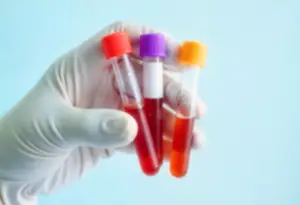Menopause is often considered a concern for women in their 50s, but new research suggests that perimenopause—the transitional phase leading up to menopause—can begin much earlier, even in women as young as 30. Despite experiencing symptoms, many young females remain undiagnosed and untreated due to the misconception that menopause is only a midlife issue.
One of the main problems with the early identification of perimenopause is that there is no universal testing. A menopause test will be able to pinpoint whether or not the hormonal changes are the cause of symptoms such as mood swings, anxiety, irregular periods, mental fogginess, and lethargy. Yet, many physicians ignore these symptoms in younger women and blame them on stress, lifestyle issues, or other conditions.
A recent paper that was published identified that more than 55% of women in the age bracket of 30-35 years experience moderate to severe perimenopausal symptoms. Conversely, over 51.5% of women over the age of 56 visit doctors for perimenopausal symptoms. The wide disparity implies that younger women are not aware of the symptoms or cannot receive appropriate diagnosis and treatment.
At The IV Lounge, we’re committed to empowering women to be in charge of their health. Our Women’s Hormone Panel provides a thorough menopause test that checks critical hormone levels, such as CMP, F&T Testosterone, Estradiol, DHEA-S, FSH, LH, Prolactin, Insulin, SHBG, and Progesterone. Getting tested allows you to catch imbalances early and take action for treatment.
What Is Perimenopause? Understanding the Early Signs
Perimenopause is the period leading up to menopause when the body slowly makes less estrogen. It may last anywhere from several months to more than ten years. Although the mean age of onset is about 45, a few women start showing symptoms as early as their 30s.
Syptoms of Perimenopause in Younger Women
- Mood Changes – More irritability, anxiety, and depression
- Brain Fog – Trouble concentrating and memory loss
- Irregular Periods – Lighter, heavier, or missed periods
- Hot Flashes and Night Sweats – Sudden waves of heat and sweating
- Sleep Disturbances – Insomnia or restless sleep
- Fatigue – Chronic tiredness and low energy levels
- Weight Gain – Changes in metabolism leading to increased body fat
- Vaginal Dryness – Discomfort during intimacy and recurring infections
Because these symptoms cross over with other medical ailments, women tend to write them off as stress or the typical aging process. A menopause test will determine if hormonal changes are behind the transformation.

Why are Young Women Ignoring Perimenopause?
- Lack of Awareness
Most women consider menopause as something that occurs in their 50s, and therefore when symptoms arise in their 30s, they don’t suspect perimenopause.
- Cultural Stigma
Menopause remains a stigmatized subject in most societies and women stay away from talking about symptoms.
- Doctor Misdiagnosis
Perimenopause is not commonly talked about in younger women, thus, symptoms can be misdiagnosed by doctors as stress, anxiety, or other unrelated medical problems.
- Delay in Treatment
Women do not even approach treatment until later 50s when they identify their symptoms, resulting in years of avoidable discomfort.
This is why it is so important to take a menopause test early on—it gives women clarity and allows them to get proper care early on before symptoms become serious.
Scientific Evidence: What the Research Indicates
Current research confirms that treating perimenopause symptoms in young women is pressing:
- More than 55% of women between 30-35 years have moderate to severe perimenopause symptoms, yet only 4.3% receive medical attention (npj Women’s Health, 2024).
- A 2022 study published discovered that untreated perimenopausal symptoms raise the risk of anxiety and depression by 40%.
- Undiagnosed hormonal imbalances put women at a 30% higher risk of developing osteoporosis and cardiovascular diseases later in life.
The science is certain: early testing and treatment can enhance long-term health.

How a Menopause Test Can Assist?
A menopause test assesses important hormones that vary during perimenopause, such as:
- FSH (Follicle-Stimulating Hormone) – Rises as the ovaries decrease estrogen production.
- Estradiol – A type of estrogen that decreases during perimenopause.
- Progesterone – A hormone that controls menstrual cycles and mood.
- Testosterone – Impacts energy, libido, and balance of mood.
- DHEA-S & SHBG – Markers of overall hormonal well-being.
By assessing these hormone levels, a menopause test can identify whether symptoms are caused by perimenopause or some other medical condition.
At The IV Lounge, our Women’s Hormone Panel offers a complete analysis of these hormones, providing insight into your hormonal well-being and informing individualized treatment protocols.
Treatment Approaches for Perimenopause
- Hormone Replacement Therapy (HRT)
HRT replaces falling estrogen and progesterone levels to alleviate symptoms of perimenopause.
Advantages: Stops hot flashes, mood swings, and osteoporosis.
Types: Comes in patches, pills, gels, injections, and creams.
- Lifestyle Modifications
- Sleep: 7-8 hours nightly to keep hormones in check.
- Hydration: Stay hydrated to aid in metabolism and general health.
- Exercise: Consistent movement, particularly resistance training, aids in weight control and mood improvement.
- Stress Relief: Yoga, meditation, and mindfulness can enhance emotional health.
- Alternative Therapies
- Vaginal Estrogen: Relieves dryness and urinary incontinence.
- Pelvic Floor Exercises: Exercises muscles to minimize urinary symptoms.
- Supplements: Magnesium, vitamin D, and omega-3s promote hormone health.
Treatment early on, at the direction of a menopause test, will make a world of difference in symptom control and long-term health.
Take Charge of Your Health with The IV Lounge
Perimenopause doesn’t have to be a mystery. If you’re experiencing unexplained symptoms like mood swings, fatigue, irregular periods, or brain fog, it’s time to take action. The IV Lounge offers a comprehensive menopause test through our Women’s Hormone Panel, including CMP, F&T Testosterone, Estradiol, DHEA-S, FSH, LH, Prolactin, Insulin, SHBG, and Progesterone.
By receiving a test, you can detect hormonal imbalances early on and discuss personal treatment plans that best suit your situation. Don’t let symptoms get out of hand—take charge of your well-being today.
Schedule your menopause test at The IV Lounge and begin feeling like yourself once more.










